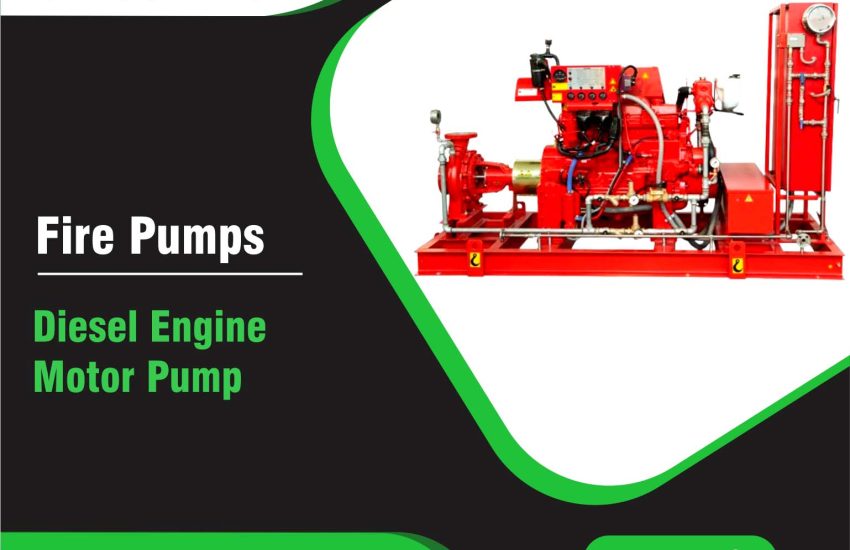Diesel Engine Motor Pump is a highly efficient and reliable device powered by a diesel engine. These pumps are essential for a variety of applications, including agriculture, construction, irrigation, firefighting, and industrial uses. They operate effectively in locations without access to electricity, making them indispensable in remote areas. This article will explore the detailed specifications of diesel engine motor pumps and highlight their key features to help you choose the right pump for your needs.
What is a Diesel Engine Motor Pump?
A Diesel Engine Motor Pump consists of a diesel engine that powers a pump to move liquids such as water, oil, or chemicals. These pumps are known for their strength, portability, and ability to function in tough conditions. Diesel-powered pumps are preferred for their high efficiency in handling large volumes of liquids, especially in areas where electrical power is unavailable.
Key Specifications of Diesel Engine Motor Pumps
- Engine Power (Horsepower)
Diesel engine motor pumps come in a variety of horsepower options, typically ranging from 5 HP to 500 HP, depending on the size and application. Higher horsepower ratings allow pumps to handle larger volumes of fluid efficiently. - Flow Rate
The flow rate of a diesel engine motor pump refers to the amount of fluid it can pump in a given time. Flow rates typically range from 100 to 10,000 liters per minute (LPM) or higher, making these pumps suitable for irrigation, construction, firefighting, and industrial operations. - Pump Type
Diesel engine motor pumps are available in various configurations:- Centrifugal Pumps: Ideal for moving large volumes of water at low pressures.
- Trash Pumps: Handle water with debris and solids, often used for construction and agricultural applications.
- High-Pressure Pumps: Designed for applications requiring high water pressure, such as firefighting.
- Maximum Head
The maximum head refers to how high the pump can lift the liquid. Diesel engine pumps typically offer head ratings ranging from 10 meters to 100 meters, depending on the size of the pump and engine. - Fuel Tank Capacity
The fuel tank capacity ensures the pump can run for several hours without needing to refuel. Most diesel pumps have fuel tanks ranging from 20 liters to 200 liters, allowing for extended operation periods. - Start Type
Diesel engine pumps come with either a manual start or electric start. The electric start option provides convenience, while the manual start is often more affordable and easier to maintain in remote areas. - Cooling System
Diesel engines are equipped with either air-cooled or liquid-cooled systems. Smaller pumps typically use air-cooled engines, while larger pumps feature liquid-cooled engines to ensure efficiency and prevent overheating during prolonged use. - Material of Construction
The materials used for construction significantly impact the durability of the pump. Most diesel-powered pumps feature cast iron, stainless steel, or aluminum, ensuring strength and resistance to corrosion. - Portability and Mounting
Diesel engine motor pumps are designed for easy mobility, with options like trailer mounts, skid mounts, or wheeled units for transport. This portability allows for quick deployment at various job sites.
Advantages of Diesel Engine Motor Pumps
- High Efficiency and Power: Diesel engines provide more power and fuel efficiency compared to gasoline engines, making them perfect for high-demand tasks such as irrigation and dewatering.
- Durability and Longevity: Diesel engines last longer and require less maintenance over time, making them ideal for continuous operation in tough conditions.
- Portability: These pumps are highly portable, making them easy to transport between job sites, whether for firefighting, agricultural use, or construction.
- Cost-Effectiveness: Diesel fuel is generally less expensive than gasoline, and diesel engines consume less fuel while offering more power, reducing operational costs.
- Reliability in Remote Areas: Diesel engine pumps don’t rely on electrical power, making them especially valuable in areas with unreliable or no electricity.
Applications of Diesel Engine Motor Pumps
1. Agriculture and Irrigation
In the agricultural sector, diesel engine motor pumps are crucial for irrigating crops. They can efficiently move water from rivers, wells, or lakes to farmland, ensuring consistent water distribution to crops, even in remote areas.
2. Firefighting
Diesel engine motor pumps play an essential role in firefighting operations. These pumps can provide high-pressure water flow for extinguishing fires in industrial facilities, forests, and urban areas. Their power and mobility make them highly effective in emergency situations.
3. Construction and Dewatering
Construction projects often involve the need to remove excess water from excavation sites, trenches, or basements. Diesel-powered pumps can quickly remove large volumes of water, ensuring construction progress is not hindered by flooding or groundwater issues.
4. Industrial Use
Industries use diesel engine motor pumps to move chemicals, oils, or other fluids within manufacturing plants. These pumps are designed to handle high flow rates and maintain continuous operation in industrial environments.
5. Mining and Quarrying
In mining, diesel engine pumps are used for dewatering pits, quarries, and tunnels. Their ability to operate without electricity and handle large amounts of water makes them perfect for such high-demand environments.
6. Emergency and Disaster Relief
During natural disasters such as floods or earthquakes, diesel engine pumps are invaluable for quickly removing water and reducing damage. These pumps provide a rapid response to disaster situations, helping to restore normalcy in affected areas.
Conclusion
A Diesel Engine Motor Pump offers superior performance and efficiency, particularly in off-grid locations. By understanding the specifications and applications of these pumps, you can choose the right model for your specific needs. Whether you require a pump for agriculture, construction, firefighting, or industrial use, a diesel-powered pump provides a reliable and cost-effective solution that ensures optimal performance in demanding environments.


